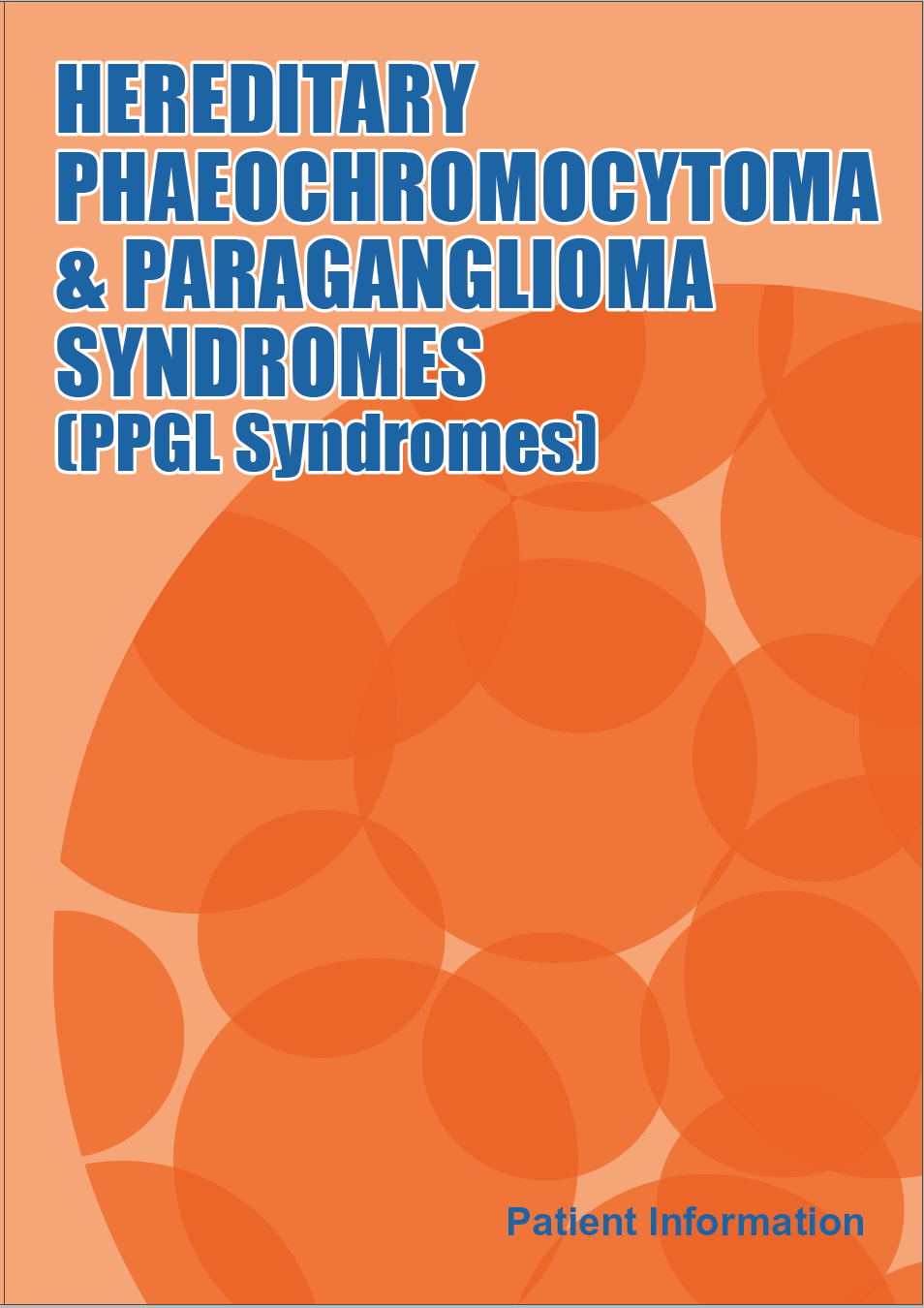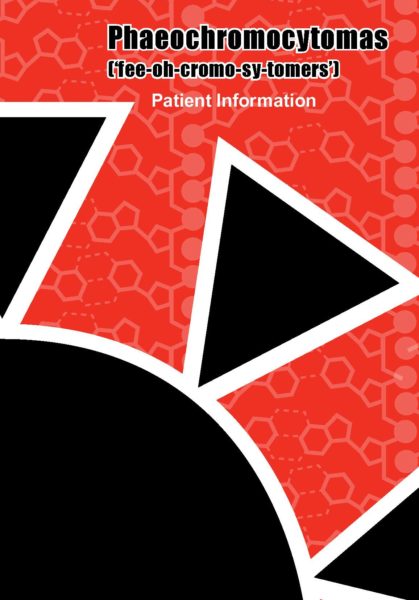What are PPGL Syndromes?
PPGL syndromes are conditions that may cause tumours called paraganglioma or phaeochromocytoma. These syndromes are caused by gene changes (mutations) that can be passed down in families. Sometimes the tumours may make greater than normal amounts of hormones, the body’s chemical messengers, which in turn may cause a range of different symptoms. These tumours grow in particular cells of the body that mean that they are classed as neuroendocrine tumours or neoplasms (NET or NEN). All the tumours in PPGL syndromes can occur alone (sporadic) and separately from an inherited syndrome.
A person may be diagnosed with an inherited PPGL syndrome after being offered a gene test. Genetic testing may be offered either after someone is diagnosed with a paraganglioma or phaeochromocytoma, or because there is a family history of a PPGL syndrome. In this way, some people may be diagnosed with a syndrome before they have developed any tumours. In addition, some people diagnosed by gene test with a syndrome may not actually develop any tumours in their lifetime.
How are PPGL Syndromes Diagnosed?
A person may be diagnosed with an inherited PPGL syndrome after being offered a gene test. Genetic testing may be offered either after someone is diagnosed with a paraganglioma or phaeochromocytoma, or because there is a family history of a PPGL syndrome. In this way, some people may be diagnosed with a syndrome before they have developed any tumours. In addition, some people diagnosed by gene test with a syndrome may not actually develop any tumours in their lifetime.
Table 1: risks of tumours in unaffected individuals with gene mutations
Gene Risk of any tumour (lifetime) Most likely position of tumour Multiple tumours Other tumours (not PGL / Phaeo) SDHB 25-30% Adrenal and extra adrenal PGL 30% Renal cell carcinomaGIST SDHD 80-90%* Head and neck 50% SDHA less than 10% Adrenal and extra adrenal PGL rarely GIST SDHAF2** 5% Head and neck 90% Not reported SDHC 10% MAX* 30-50% Adrenal 60% Not reported TMEM127* 40-80% Adrenal 25% Not reported * If inherited from the father
** Data is limited as numbers of cases are small and therefore the tumour risks are likely to be overestimates
Regular Screening in PPGL Syndromes
After any initial treatment has been done, anyone with a PPGL gene change (and therefore a PPGL syndrome) should enter a long-term screening programme. In this way, any other tumours should be found earlier before symptoms occur. This should also make treatment easier. The programme would be similar for people who have already had treatment, and for those who are not yet affected (and may not be affected during their lifetime).
At the current time, there are no formally recognised UK guidelines for screening of individuals with PPGL Syndromes. However, most regional genetics services would suggest the following in the table below for most of the syndromes. However, if a child/adult has inherited a SDHD, SDHAF2 or MAX mutation from their mother, screening is not suggested as only mutations inherited from their father will mean that they develop tumours.
Gene Recommended surveillance SDHB · Annual hospital appointments and blood tests· Abdominal imaging* at baseline and if normal every 12-24 months · MRI/CT neck, chest at baseline and if normal every 3 years
SDHD · Screening should only be offered to patients who have a gene change passed down from their father.· Annual hospital appointments and blood tests · Abdominal imaging* and MRI/CT neck, chest at baseline and if normal every 3 years
SDHC · Annual hospital appointments and blood tests· Abdominal imaging* and MRI/CT neck, chest at baseline and if normal every 3 years SDHA · Annual hospital appointments and blood tests· Abdominal imaging* and MRI/CT neck, chest at baseline and if normal every 3-5 years SDHAF2** · Screening should only be offered to patients who have a gene change passed down from their father· Annual hospital appointments and blood tests · Abdominal imaging* at baseline and if normal every 3 years
· MRI of neck, chest at baseline and if normal every 5 years
MAX** · Screening should only be offered to patients who have a gene change passed down from their father· Annual hospital appointments and blood tests · Abdominal imaging* at baseline and if normal every 3 years
· MRI of neck, chest at baseline and if normal every 5 years
TMEM127** · Annual hospital appointments and blood tests· Abdominal imaging* at baseline and if normal every 3 years · MRI of neck, chest at baseline and if normal every 5 years
*MRI is the preferred method of screening but CT may be required in some instances if MRI not tolerated or unavailable.
Further Reading
AMEND has developed a new group identity for those with PPGL syndromes (Phaeo Para Support UK) including a dedicated website (www.phaeoparasupport.org.uk) that was launched on 24th August 2020. You will find dedicated resources there including patient experience stories.
-
Hereditary Phaeo Para Syndromes

NEW in August 2020
View Booklet
-
Phaeochromocytomas

2023 Update. This booklet is primarily regarding non-inherited phaeochromocytomas but may be useful. We recommend that you discuss the content of this booklet with your specialist - it is not for use in self-diagnosis, and not all of the information it contains may be relevant to you.
View Booklet
Patient Experience Films
Introducing SDH Syndromes – Patient Experience Films
We are truly grateful to Karen Williams, Andy Price and Crystal Miller for sharing their experiences in our films, produced in early 2020 and launched on Saturday 16th May, which would have been our Annual Patient Information Day in London. Sadly this was cancelled due to the coronavirus pandemic. We are glad that we can still bring you these films, produced by the fabulous Red Goat Productions.
We hope that you find them useful, interesting and stimulating.
-
Introducing SDH Syndromes - Diagnosis
-
Introducing SDH Syndromes - Treatment
-
Introducing SDH Syndromes - Future
Author: Jo Grey, AMEND CEO, with the help of the AMEND Medical Advisory Team
Be involved
-
Make a donation
AMEND has a variety of ways to donate to show your appreciation for our work.
Donate now
-
Become an AMEND member
Membership is free so come and join our family
Join us
-
Latest News
AMEND is pleased to bring you our latest publication: ‘Starting a Family: Your Choices’. Funded by a grant from the Society for Endocrinology, this…
View News